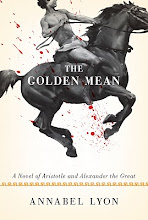/plato%20and%20aristotle.jpg)
A detail from Raphael's School of Athens, featuring Plato and Aristotle. Painted in 1510-11, it's a fresco in one of the rooms known as the Stanze di Raffaello, in the Apostolic Palace in the Vatican.
From Wikipedia: "In the center of the fresco, at its architecture's central vanishing point, are the two undisputed main subjects: Plato on the left and Aristotle, his student, on the right. Both figures hold modern (of the time), bound copies of their books in their left hands, while gesturing with their right. Plato holds Timaeus, Aristotle his Nicomachean Ethics. Plato is depicted as old, grey, wise-looking, bare-foot. By contrast Aristotle, slightly ahead of him, is in mature manhood, handsome, well-shod and dressed, with gold, and the youth about them seem to look his way. In addition, these two central figures gesture along different dimensions: Plato vertically, upward along the picture-plane, into the beautiful vault above; Aristotle on the horizontal plan at right-angles to the picture-plane (hence in strong foreshortening), initiating a powerful flow of space toward viewers. It is popularly thought that their gestures indicate central aspects of their philosophies, Plato's his Theory of Forms, Aristotle's his empiricist views, with an emphasis on concrete particulars. However Plato's Timaeus was, even in the Renaissance, a very influential treatise on the cosmos, whereas Aristotle insisted that the purpose of ethics is "practical" rather than "theoretical" or "speculative": not knowledge for its own sake, as he considered cosmology to be."

No comments:
Post a Comment